With N7 Day only just behind us, what better way to continue celebrating 10 years of Mass Effect than with another in-depth discussion about the games? One, in particular.
Mass Effect: Andromeda was possibly one of the most anticipated games of 2017, and expectations were certainly high. Shelby from Falcon Game Reviews and I just finished a collaborative project for N7 Day, during which we discussed the strengths and failings of this most recent game in the Mass Effect franchise. I highly recommend you check it out if you haven’t already; we had a good conversation and it’s not over yet!
The first part of this article will be discussing elements from the original trilogy that are found in Andromeda (and may have minor unmarked spoilers), followed by a discussion of gameplay elements, and a few areas for improvement. The final section will discuss themes and narrative, and will have unmarked spoilers (you’ll see the stop sign before it!).
Entering Andromeda
A long time ago, I wrote a first impressions post and talking about some of the great things about the game and the not-so-great things that grabbed my attention about the game. I revisited that post, and of course I stand by the things that I said, but having played the game once (clocking over 200 hours in it) and having re-started the game with all the patches in place, I think it’s safe to say that, regardless of its flaws, there is something special about Andromeda that maybe doesn’t get enough credit.
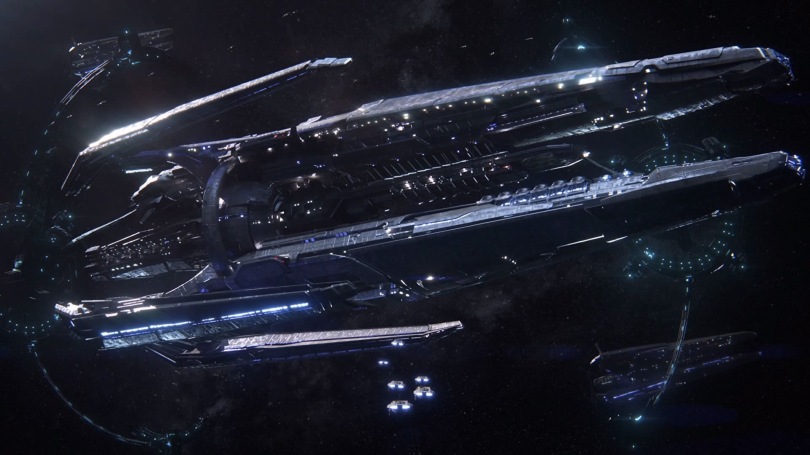
It’s a good game. That’s what doesn’t get enough credit. It’s a good game that had a botched release that then spiraled out of control because of current media culture.
So, let’s cut through all the nonsense and take a look at the game as an experience, rather than as a means of commenting on development cycles, fan hysteria, or other gaming culture issues that have come up after Andromeda‘s release.
Andromeda is, first and foremost, a whole new galaxy, full of new challenges, characters, and stories, and one of the things that I liked best was how the game both looks back fondly at the past games, and looks forward with excitement into the future in a new world.

A Nod Back
Part of Andromeda‘s strength – and part of its weakness – is that it is part of a franchise that has so much nostalgia attached to it. Like The Legend of Zelda or any other long-standing game, there was a lot of pressure to build on the shoulders of the giants that came before, while also creating a unique and memorable identity that would do the franchise proud. And no one can argue that the ambitions – and hype – for this game were high!
Mass Effect: Andromeda tried to pull the most iconic aspects of the original trilogy and put them all into one game, trying to give gamers a well-crafted experience that would be like a favorite meal: only the best parts of an already-strong series would be there.
The first deviation from the original trilogy is, of course, the introduction of a new main character: Sara and/or Scott Ryder. While some fans prickled at the addition of the new playable character, often citing disappointment that Ryder was inept compared to Shepard, I found the change refreshing. The game took an average human being and thrust them into the spotlight, echoing the zero-to-hero arc of Shepard across three games.
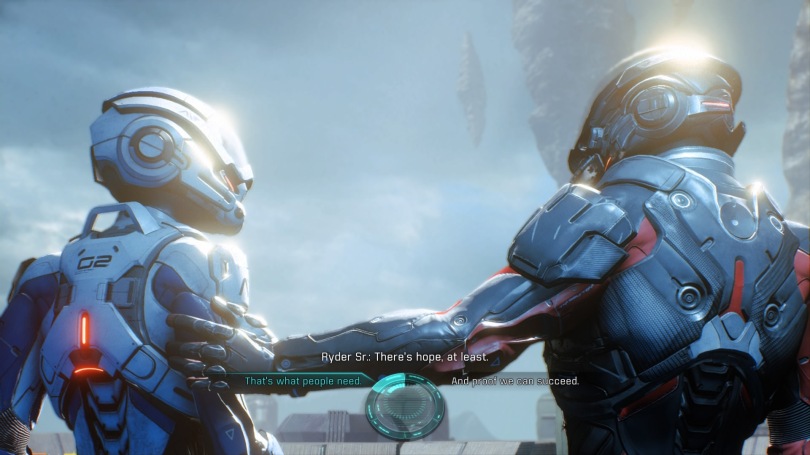
One particular point of interest for me was on the first tutorial planet, during which Ryder and crew are fighting for survival alongside Ryder’s father, who just so happens to be an N7 operative. Seeing Ryder, Sr., seamlessly cutting through enemies while I – as Ryder – struggled to keep up created an interesting juxtaposition of feelings. On one hand, as the playable character, I wanted to of course be the hero, but Ryder wasn’t an N7 like her (/his) dad.
Except she was now the Pathfinder. So, shape up, Skipper. It was a big arc to go through in one game, but the echo of seeing Shepard go from Alliance hero to galactic savior was no different.
Mass Effect 2 was lauded for its tight story and focus on companion characters, and so Mass Effect: Andromeda nodded to that by providing a small crew of characters, each with their own motivations, backstories, and side missions that tried to keep this massive game feeling small and personal. Like Shepard installing a memorial wall in the SSV Normandy, it was a way to remember the real reason Ryder was trying to find a home: not for the Initiative, but for the people.

And, of course, Mass Effect 3 would not have nearly been as memorable without the clear and present danger of the Reapers. The imminent threat of destruction, along with the new focus on combat, was, for me, the most defining features of that game, and Mass Effect: Andromeda build on those shoulders, giving players wonderfully smooth controls that were perfect for combat, and dumped an entire race of aliens dedicated to assimilating all biological organisms into their collective species into the mix for good measure.
In each case, Andromeda tried to build on what had come before, even taking criticisms of the Mako and developing the Nomad to handle “better” than my favorite tank the Normandy‘s tank and even giving Ryder a jetpack to add more lateral gameplay elements that couldn’t be explored in the original trilogy.
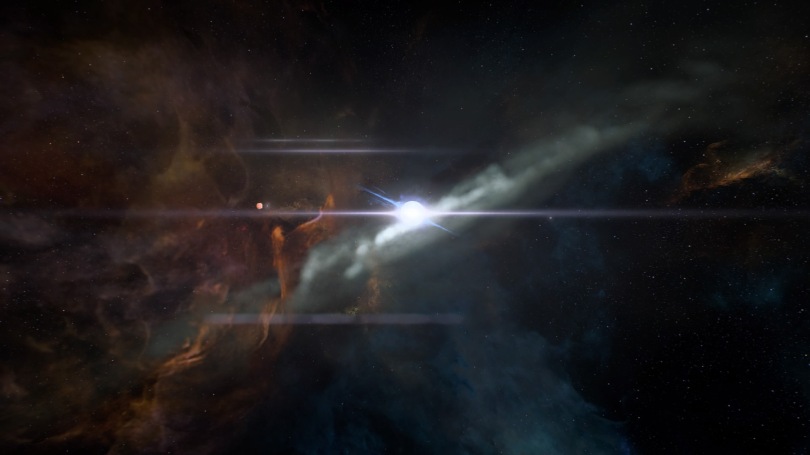
Of course, the way the game handled the endings of the first trilogy was brilliant. The Initiative left before the Reaper War began, and the last transmission they received from the Milky Way was before the final battle. So… all endings are canon.
To that, I tip my hat.
But games can’t run on nostalgia alone, and Mass Effect: Andromeda certainly tried to carve its own identify out within the Mass Effect family of games.
To Boldly Go…
Mass Effect: Andromeda sought to be a bigger version of the original Mass Effect, taking the spirit of exploration that wasn’t capable in that first game and bringing it to current generation consoles. And in many ways, it succeeded. Driving the Nomad around on planets was fun, there were almost always things to do from one point to another, and the addition of the jetpack added an interesting platforming mechanic that allowed for unique areas to traverse on foot.
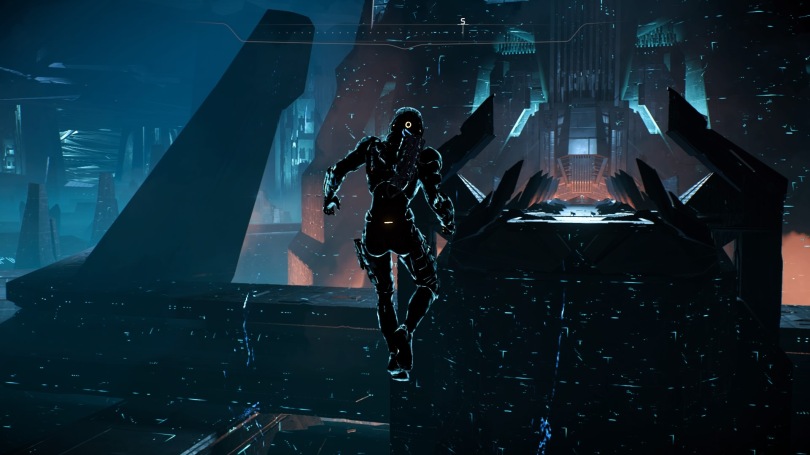
Additionally, BioWare added a lovely feature that allowed players to change the character’s class at will, so it was possible to switch from infiltrator to soldier to biotic and back as desired. And the flexibility within each class was wonderfully welcome, enabling me to be an infiltrator that shot fireballs and could wield an assault rifle when necessary.
But there’s never been any debate that the worlds were expansive and combat was great. What this huge galaxy also had to do was scale back Commander Shepard’s massive space opera and make the story small and personal again like it was way back in the original Mass Effect. After ending Shepard’s saga at a demi-godlike status in Mass Effect 3, the narrative needed to be reset, just like Dragon Age II needed to do in that series.
There were some stumbles here, but nothing that was, in my opinion, detrimental enough to ruin the entire experience.
And, as much as I was very overwhelmed during the first mission, upon reflection it was what the game needed: it captured the insanity of the situation well. And the problems continued to multiply as time went on, creating an unexpectedly chaotic environment in-game that echoed the unexpected chaos of the peaceful voyage to Andromeda. After all, Ryder is dealing with unexpected family issues, having no home, few resources, the aftereffects of a revolt, and thousands of people counting on her, on top of having the full responsibility of the entire Initiative thrust on her shoulders.

No wonder Habitat 7 was a baptism by fire. The whole situation in Andromeda is a baptism by fire. Over a very short period of time, she went from being the nobody-daughter of “The Pathfinder” to being required to navigate the politics on the Nexus, find a home planet, and keep the kett from destroying their new home, all at once. It was intense and required a lot of juggling, and lot of time, and a lot of memory. It seemed overwhelming at times, which fit well with how overwhelmed Ryder probably felt, as well.
To Boldly Wander…
The story, which we’ll talk about more below, was ambitious, to say the least. While the main storyline and the companion characters provided the familiar tightness of a good Mass Effect game, at times I though that the game’s bloat diluted the emotional intensity a bit. I would have liked if the galaxy had been a little smaller in order to focus on the political nonsense that seemed to be an undercurrent throughout the game but never really made a true appearance.
Having the administration constantly on Ryder’s case while she tries to find a home and deal with the kett might have pressed home how thinly spread Ryder really was, or possibly having her need to have a few more conversations with her brother in order to expedite his healing, just to make sure the player could feel obligated to visit because of familial reasons, but also burdened by the illness of a loved one, as is sometimes the case in real life, as well.

My biggest criticism of the game is that although it was big, and was certainly full of things to do, the story was ultimately spread very thin. Recently open-world bloat has been a topic of interest, and unfortunately Mass Effect: Andromeda fell into the trap. It seems like open-world games are designed to be sprawling, which is fine, but it’s hard to maintain a tight story (which, let’s face it, is sort of important for an RPG), when there is too much to do.
The following section is full of unmarked story spoilers. Proceed with caution! Skip forward to the spoiler-free Conclusion if you need to!

Spoilers abound in 3… 2… 1…
The End of Childhood
One of the lines of dialogue that stuck with me came from Jaal, the angaran Ryder befriends and subsequently becomes part of the squad. He thoughtfully considers Ryder before saying, “Perhaps, then, if we are all aliens, it is about what kind of alien we are.”

Up until this point, I had been going along with the idea of Andromeda examining how humans might act in a similar situation. After all, study the history of the Aztecs, Mayans, or various Native American tribes in the United States and you can see a glimpse into how that went here on Earth.
In Andromeda, there are two aliens: the kett, who after a time seemed to represent the worst of humanity, and the Milky Way species, who represented the neutral-to-best. There was this philosophical difference between these two groups, with one working on the selfish desires of preserving self at the cost of another group of people, or, perhaps worse, by actively destroying another group, and the other group striving to learn and understand about the new environment around us, in order to work harmoniously with ideas not our own.
A battle between base instincts and higher thinking. A battle that, perhaps, we all go through in our lives.

Again and again, this came up. Do you treat the small uprising on the Nexus as an enemy, or do you try and help them and understand their situation? Do you just follow orders for the sake of maintaining order, or do you operate on ideals because, to quote the Inquisitor from Dragon Age: Inquisition, now is precisely the time for ideals?
Sure, this was subtle, and sometimes choosing between these two options seemed a little ridiculous. And sometimes your arm was twisted and there was no good answer. So what type of human are you? As the trailer reminded us again and again, we are “only human, after all.” Andromeda threw us into an area where we were uncomfortable and gave us no real “ideal” way out of things, because that’s how life goes sometimes.
The other predominant theme that I really enjoyed puzzling through was the idea of choice/free will versus predetermination. After discovering that the angara was a species created by the mysterious Jardaan, Jaal opines that there must have been a purpose they had been created, and the Jardaan must have had some plan for them. And yet, this was in a game asking us again and again to choose what type of person we are. Can these two ideas coexist together, as Suvi so adamantly argues?
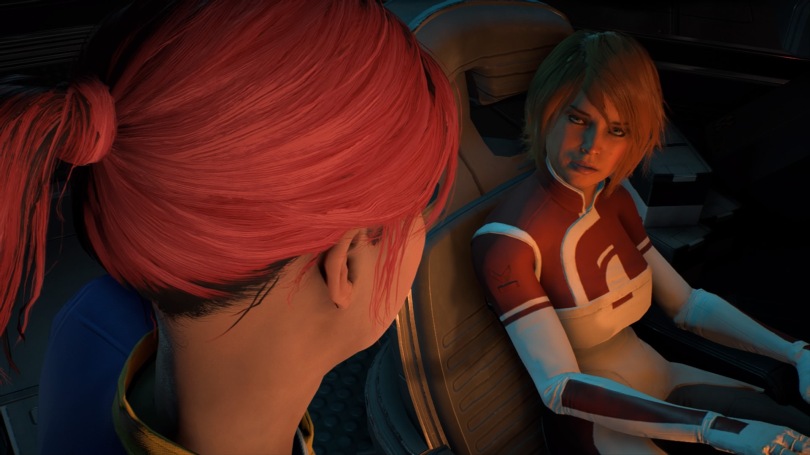
Can we be scientists and spiritual at the same time? Even Cora questions the likelihood of this being the case, wondering if the Jardaan had a plan for the angara, where exactly would the Milky Way species fit it? Did the Jardaan know they were coming, supporting predetermination, or not, supporting choice? Or is life a combination of free will and predetermined path?
You can be sure that this will be revisited in a future post, but suffice it to say for now that the way the game handled questioning who you are and how you see yourself in the world was subtle, but left an impression.
That’s one thing I’ll say: BioWare’s still got it in them.
Conclusion
I realized while I was playing Andromeda that, despite its flaws, I kept coming back to it. I wanted to know what happened next, and what happened to the characters. I found myself caring about the galaxy, and, despite some of my criticism about bloat that I would apply to many open-world games today, getting pulled in. I mean, 200 hours is a lot to spend with a game you hate. And, truth be told, I want to play it again.

Overall, I think Andromeda is much like Skyward Sword: there are certain series that, on the occasion there is a “bad” game in them, they are still often better than some “good” games that are out there. In a way, that makes it hard to stomach the stumbles because we are used to excellence, or are blinded by nostalgia, and so can’t see the good thing in front of us. But that doesn’t mean that the game is objectively poor by any stretch of the imagination.
I can’t fix the negative reviews and hate comments thrown at Andromeda. I can’t say that bloat in an RPG isn’t annoying. But I can say that the time I spent helping Ryder and friends find a home and save a new galaxy was a fun and memorable experience, and I hope one day people will see the game for its merits, and not the drama that surrounded its release.
Have you played Mass Effect: Andromeda? What did you think of it? Is it good, bad, or somewhere in between? What was your favorite part? Let me know in the comments!
Thanks for stopping by, and I’ll see you soon!
~ Athena
What’s next? You can like, subscribe, and support if you like what you’ve seen!
– Support us on Patreon, become a revered Aegis of AmbiGaming, and access extra content!
– Say hello on Facebook, Twitter, and even Google+!
– Check out our Let’s Plays if you’re really adventurous!
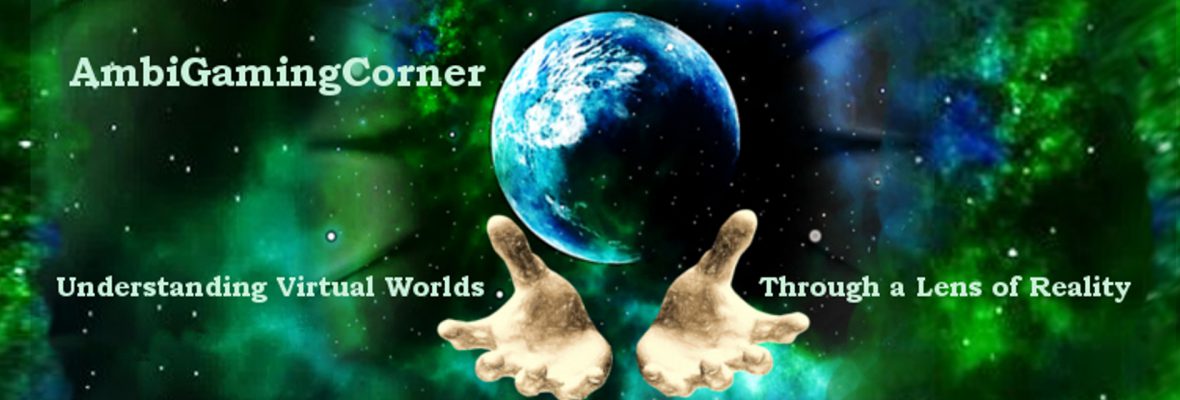

I didn’t really mind all the side quests because the combat was so fun. What I did mind was that damn remnant cores quest that was broken on release in a way that makes it impossible to complete in my save now even after they patched it, so now I’m stuck at 99% completion forever. Oh well.
LikeLiked by 1 person
It was still worth it.
LikeLiked by 1 person
Oh, I don’t think I ever did that quest, but I heart about it. Yeah, that’s totally bogus.
Yeah, some of the sidequests were fun and the combat definitely helped with that. I know I found myself sort of losing the thread of the main story, though, which is more where my criticism came from. BUT there is no accounting for just having a good time!
LikeLiked by 1 person
I thought of Ryder as a sort of young Shepard. Shepard went through their own coming of age adventure before the start of Mass Effect. I saw Ryder’s adventure here as the sort of thing that made Shepard famous before s/he was a specter. It was ok that Ryder wasn’t a total badass that everyone respected. They still had a way to go.
LikeLiked by 1 person
Yes, I’d agree with the coming-of-age comparison between the two, and I think that’s one of the reasons I actually liked Ryder as a character – maybe that was what Shepard was like before the events of their “military history” profile story.
LikeLike
I like Mass Effect Andromeda. It’s a shame the media had their way with it. It really was not as nearly bad as what they made it out to be, and over what? Some occasional facial animations that just appeared a little odd? Such a shame.
That’s not to say it’s without it’s problems, and you’re statement here echoes my biggest concern of ME Andromeda
“While the main storyline and the companion characters provided the familiar tightness of a good Mass Effect game, at times I though that the game’s bloat diluted the emotional intensity a bit”
I felt the story was diluted because it just felt so big. It made it very hard for me to focus on personal and intimate things Ryder was going through because it just threw so much at my so fast.
Open World bloat is also a problem as I found many side missions very meaningless, but at a point, I focused on just the main story and squad missions and the game was so much more enjoyable. And I do like the change of going from Sheppard to Ryder. Being Ryder, you had that sense that what was going on around you was just bigger than you, and you were way less experienced for the job, and I found the game effectively conveyed this to the player. It made the sense of exploration and discovery a bit more exciting to have Ryder made this way. Sheppard is great, but he just always seemed to have a handle of things, so experience was I feel was the exact opposite as Ryder was refreshing.
LikeLiked by 1 person
I enjoyed my time with it, as well. It was a huge game and I think it took “open world” a bit too far (as tends to be the norm now?), but it was fun and had a cool story.
I’m playing through the Mass Effects again, and I’m likewise focusing on the story and sidequest missions more than the general fluffy stuff that’s in there, and it’s a much tighter/better experience, in my opinion, too.
I really loved the introduction of Ryder, especially when some lines like “I followed protocol, mostly because I was making it up as I went along” and “Well, scan them back!” came up, really accentuating that you were playing as an average person who was in over their head and doing the best they can. It was really nice to play as a character that didn’t automatically have their stuff together!
LikeLiked by 1 person
Proud to have Platinumed this one! I loved the gameplay elements (using Biotic powers and the ability to switch roles with SAM was awesome). And ZOMG, the jetpack was such a fun mechanic. I want to see this turned into a trilogy since BioWare left so many story things hanging. I hope they ignore all fan drama, lock EA’s marketing executives out of their office, and then go for it, haha.
Great review! I’m planning on doing a review of my own soon-ish… on the condition I don’t completely forget everything about the game before I get around to it 😛
LikeLiked by 1 person